Μετάφραση και ανάλυση λέξεων από την τεχνητή νοημοσύνη ChatGPT
Σε αυτήν τη σελίδα μπορείτε να λάβετε μια λεπτομερή ανάλυση μιας λέξης ή μιας φράσης, η οποία δημιουργήθηκε χρησιμοποιώντας το ChatGPT, την καλύτερη τεχνολογία τεχνητής νοημοσύνης μέχρι σήμερα:
- πώς χρησιμοποιείται η λέξη
- συχνότητα χρήσης
- χρησιμοποιείται πιο συχνά στον προφορικό ή γραπτό λόγο
- επιλογές μετάφρασης λέξεων
- παραδείγματα χρήσης (πολλές φράσεις με μετάφραση)
- ετυμολογία
Earth satellite - translation to ρωσικά
общая лексика
спутник Земли
общая лексика
искусственный спутник
Ορισμός
Βικιπαίδεια

A satellite or artificial satellite is an object intentionally placed into orbit in outer space. Satellites have a variety of uses, including communication relay, weather forecasting, navigation (GPS), broadcasting, scientific research, and Earth observation. Additional military uses are reconnaissance, early warning, signals intelligence and, potentially, weapon delivery. Other satellites include the final rocket stages that placed satellites in orbit and formerly useful satellites that are now defunct.
Except for passive satellites, most satellites have an electricity generation system for equipment on board, such as solar panels or radioisotope thermoelectric generators (RTGs). Most satellites also have a method of communication to ground stations, called transponders. Many satellites use a standardized bus to save cost and work, the most popular of which is small CubeSats. Similar satellites can work together as a group, forming constellations. Because of the high launch cost to space, satellites are designed to be as lightweight and robust as possible. Most communication satellites are radio relay stations in orbit and carry dozens of transponders, each with a bandwidth of tens of megahertz.
Satellites are placed from the surface to orbit by launch vehicles, high enough to avoid orbital decay by the atmosphere. Satellites can then change or maintain the orbit by propulsion, usually by chemical or ion thrusters. In 2018, about 90% of satellites orbiting Earth are in low Earth orbit or geostationary orbit; geostationary means the satellites stay still at the sky. Some imaging satellites chose a Sun-synchronous orbit because they can scan the entire globe with similar lighting. As the number of satellites and space debris around Earth increases, the threat of collision has become more severe. A small number of satellites orbit other bodies (such as the Moon, Mars, and the Sun) or many bodies at once (two for a halo orbit, three for a Lissajous orbit).
Earth observation satellites gather information for reconnaissance, mapping, monitoring the weather, ocean, forest, etc. Space telescopes take advantage of outer space's near perfect vacuum to observe objects with the entire electromagnetic spectrum. Because satellites can see a large portion of the Earth at once, communications satellites can relay information to remote places. The signal delay from satellites and their orbit's predictability are used in satellite navigation systems, such as GPS. Space probes are satellites designed for robotic space exploration outside of Earth, and space stations are in essence crewed satellites.
The first artificial satellite to be launched into the Earth's orbit was the Soviet Union's Sputnik 1, on 4 October 1957. As of April 2022, there were 5,465 operational satellites in Earth orbit, of which 3,434 belong to the United States (2,992 commercial), 541 belong to China, 172 belong to Russia, and 1,319 belong to other nations.


![Deployment of the [[Earth Radiation Budget Satellite]] on [[STS-41-G]], collecting data on Earth's weather and climate Deployment of the [[Earth Radiation Budget Satellite]] on [[STS-41-G]], collecting data on Earth's weather and climate](https://commons.wikimedia.org/wiki/Special:FilePath/Earth Radiation Budget Satellite.jpg?width=200)

![The [[International Space Station]]'s black solar panels on the left and white [[radiator]]s on the right The [[International Space Station]]'s black solar panels on the left and white [[radiator]]s on the right](https://commons.wikimedia.org/wiki/Special:FilePath/ISS-54 ELC-1, main solar arrays and radiators seen from the Cupola.jpg?width=200)
![Firing of ''[[Deep Space 1]]''<nowiki/>'s ion thruster Firing of ''[[Deep Space 1]]''<nowiki/>'s ion thruster](https://commons.wikimedia.org/wiki/Special:FilePath/Ion Engine Test Firing - GPN-2000-000482.jpg?width=200)
![Orbital launch]] project at advanced stage or indigenous [[ballistic missile]]s deployed}} Orbital launch]] project at advanced stage or indigenous [[ballistic missile]]s deployed}}](https://commons.wikimedia.org/wiki/Special:FilePath/Space capabilities - launch and satellite.png?width=200)
![Replica of the [[Sputnik 1]] Replica of the [[Sputnik 1]]](https://commons.wikimedia.org/wiki/Special:FilePath/Sputnik asm.jpg?width=200)
.png?width=200)
